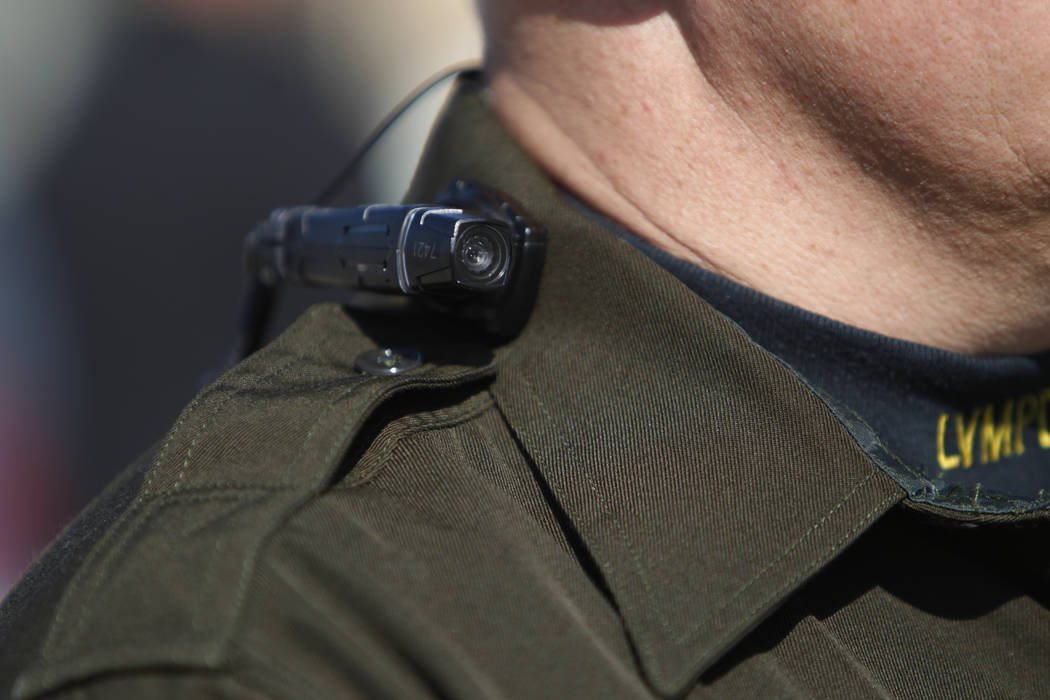Civil rights advocates question Las Vegas police body camera policy
Local civil rights advocates are questioning the Metropolitan Police Department’s body-worn camera protocol, particularly how it handles policy violations.
After examining body-worn camera policies outlined in Metro documents, local NAACP chapter Vice President Alex Cherup and longtime civil rights advocate Gary Peck say the body-worn camera policy needs revisiting, especially in light of two recent studies of the effects of the cameras on policing.
Peck said he doesn’t doubt Metro’s intentions to try to do what’s best for the community and law enforcement.
“We just question what they’ve come up with,” said Peck, who is collaborating with Cherup.
In a statement to the Las Vegas Review-Journal, the department said it was aware of concerns about the body-worn camera policy.
“The LVMPD body-worn camera policy is one of the most progressive policies in the nation,” the department wrote. “With that being said, we continue to evaluate best practices and how we can balance the need to be transparent to our public while also recognizing individual privacy issues.”
On Nov. 27, Metro announced the findings of a study, which indicated the department’s use of body-worn cameras correlated with a drop in police misconduct, complaints and use of force.
In contrast, a Washington, D.C., police study concluded that body-worn cameras had negligible effects on misconduct complaints.
Peck said the conflicting conclusions show that both studies need critical scrutiny. “It is not unreasonable to think that policies that best ensure officer compliance and accountability will result in greater benefits for the police and the public.”
Regardless, he and Cherup commended Metro for participating in the study and for its continuing dialogue on how best to police the use of body-worn cameras.
Discipline
A Metro document obtained by the Review-Journal appears to indicate that officers who fail to turn on a body-worn camera when required face escalating discipline. The first three offenses result in a report; the fourth offense results in supervisor intervention; the fifth offense results in written reprimand; and subsequent violations result in unspecified progressive discipline.
When asked about the document, originally acquired by the NAACP through a September records request, Metro in a statement acknowledged that the department used progressive discipline and said it was in negotiations with the police union on a new disciplinary matrix.
Steve Grammas, president of the Las Vegas Police Protective Association, confirmed that the union is negotiating with Metro on a new disciplinary policy, but added that the document may represent an older version of discipline guidelines.
Currently, discipline falls under a general catch-all within Metro’s discipline matrix, Grammas said, which allows supervisors to discipline officers for actions not specifically mentioned in the existing rules.
He said negotiations include how to better incorporate body-worn camera violations into its discipline policy. Grammas said he hoped an agreement would be reached early next year.
ACLU of Nevada director Tod Story said such an addition was “long overdue,” and should spell out the consequences for violating the policy.
Peck and Cherup said they understand Metro negotiates with the police union on disciplinary issues, and that privacy issues come into play when discussing individual officers and discipline.
“And we know that the rights of officers need to be respected but not at the expense of ensuring policing that is responsive to community needs,” Peck said.
Compliance
Recently, Grammas said, police have employed a gradually increasing compliance threshold for officers.
Officers have complied with body-worn camera activation requirements more than 80 percent of the time, Undersheriff Kevin McMahill told radio station KNPR in a Thursday interview. McMahill attributed a rise in compliance to officers learning that camera footage was protecting them, and he noted that more than 700 officers had been cleared in internal affairs investigations.
A call to McMahill last week was not returned.
Story said the current policy lacks a necessary compliance mechanism.
“The policy is only as good as its enforcement,” he said.
Story said officers received a pay raise for wearing body-worn cameras, as outlined in a collective bargaining agreement. By the same token, he suggests the department should tie compliance to officers’ pay: “If they can be incentivized, then they can be punished.”
Cherup and Peck also said Metro should ensure that any new discipline policy is stringent, and doesn’t allow repeated noncompliance before the department imposes formal discipline.
Other concerns
Peck denounced Metro’s decision to prohibit body-worn cameras from recording in jails. He said privacy issues may be at play, but he called the policy “very problematic,” particularly in cases in which police may have to use force.
He and Cherup also expressed concerns about Metro’s video retention policy, which requires Metro to keep videos for different lengths of time depending on the details of each call. Retention periods stretch from 45 days for uncategorized recordings and up to 20 years for homicides.
Short video retention periods can limit the number of people who come forward with complaints, Peck cautioned. He argued that a short retention period doesn’t account for people who might not be ready to file a complaint within the allotted time frame.
“We don’t begrudge the department’s view that is has a progressive policy, but we still believe it is a flawed policy,” Peck said.
Contact Mike Shoro at mshoro@reviewjournal.com or 702-387-5290. Follow @mike_shoro on Twitter.


















